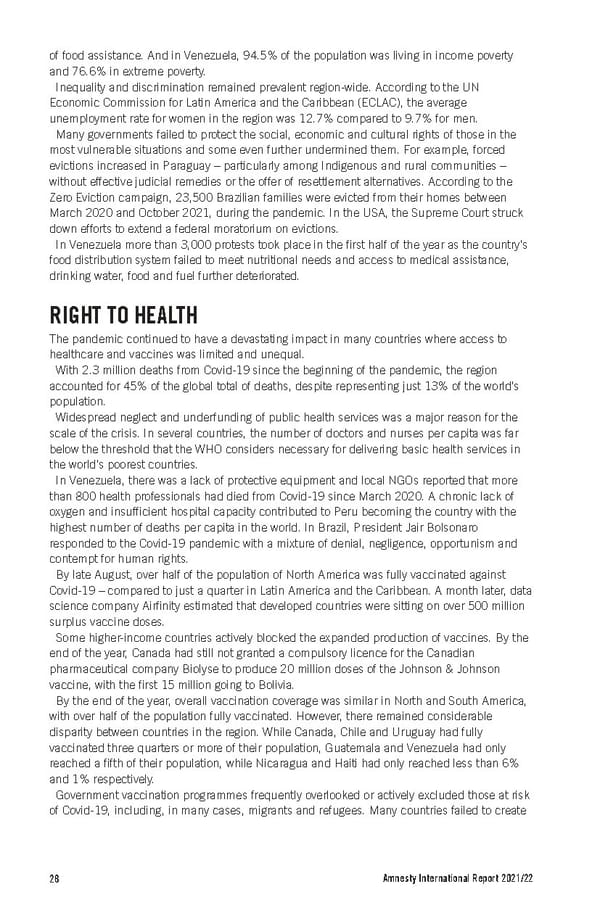of food assistance. And in Venezuela, 94.5% of the population was living in income poverty and 76.6% in extreme poverty. Inequality and discrimination remained prevalent region-wide. According to the UN Economic Commission for Latin America and the Caribbean (ECLAC), the average unemployment rate for women in the region was 12.7% compared to 9.7% for men. Many governments failed to protect the social, economic and cultural rights of those in the most vulnerable situations and some even further undermined them. For example, forced evictions increased in Paraguay – particularly among Indigenous and rural communities – without effective judicial remedies or the offer of resettlement alternatives. According to the Zero Eviction campaign, 23,500 Brazilian families were evicted from their homes between March 2020 and October 2021, during the pandemic. In the USA, the Supreme Court struck down efforts to extend a federal moratorium on evictions. In Venezuela more than 3,000 protests took place in the first half of the year as the country’s food distribution system failed to meet nutritional needs and access to medical assistance, drinking water, food and fuel further deteriorated. RIGHT TO HEALTH The pandemic continued to have a devastating impact in many countries where access to healthcare and vaccines was limited and unequal. With 2.3 million deaths from Covid-19 since the beginning of the pandemic, the region accounted for 45% of the global total of deaths, despite representing just 13% of the world’s population. Widespread neglect and underfunding of public health services was a major reason for the scale of the crisis. In several countries, the number of doctors and nurses per capita was far below the threshold that the WHO considers necessary for delivering basic health services in the world’s poorest countries. In Venezuela, there was a lack of protective equipment and local NGOs reported that more than 800 health professionals had died from Covid-19 since March 2020. A chronic lack of oxygen and insufficient hospital capacity contributed to Peru becoming the country with the highest number of deaths per capita in the world. In Brazil, President Jair Bolsonaro responded to the Covid-19 pandemic with a mixture of denial, negligence, opportunism and contempt for human rights. By late August, over half of the population of North America was fully vaccinated against Covid-19 – compared to just a quarter in Latin America and the Caribbean. A month later, data science company Airfinity estimated that developed countries were sitting on over 500 million surplus vaccine doses. Some higher-income countries actively blocked the expanded production of vaccines. By the end of the year, Canada had still not granted a compulsory licence for the Canadian pharmaceutical company Biolyse to produce 20 million doses of the Johnson & Johnson vaccine, with the first 15 million going to Bolivia. By the end of the year, overall vaccination coverage was similar in North and South America, with over half of the population fully vaccinated. However, there remained considerable disparity between countries in the region. While Canada, Chile and Uruguay had fully vaccinated three quarters or more of their population, Guatemala and Venezuela had only reached a fifth of their population, while Nicaragua and Haiti had only reached less than 6% and 1% respectively. Government vaccination programmes frequently overlooked or actively excluded those at risk of Covid-19, including, in many cases, migrants and refugees. Many countries failed to create Amnesty International Report 2021/22 28
 Amnesty International Report 2021/22 Page 27 Page 29
Amnesty International Report 2021/22 Page 27 Page 29